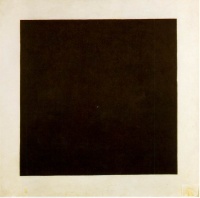Void
From The Art and Popular Culture Encyclopedia
(Difference between revisions)
| Revision as of 06:26, 27 April 2014 Jahsonic (Talk | contribs) ← Previous diff |
Revision as of 06:27, 27 April 2014 Jahsonic (Talk | contribs) Next diff → |
||
| Line 12: | Line 12: | ||
| *[[Lack]] of matter, or [[vacuum]] | *[[Lack]] of matter, or [[vacuum]] | ||
| *[[A Void (novel)|''A Void'' (novel)]], translation into English of ''La Disparition'' | *[[A Void (novel)|''A Void'' (novel)]], translation into English of ''La Disparition'' | ||
| - | *''[[Enter the Void]]'', a movie by Gaspar Noé 2009 | ||
| *Void, or [[Shunyata]], Buddhist philosophical concept | *Void, or [[Shunyata]], Buddhist philosophical concept | ||
| *[[Nothing]], is the absence of everything or a void. | *[[Nothing]], is the absence of everything or a void. | ||
| Line 19: | Line 18: | ||
| ==See also== | ==See also== | ||
| *[[Saut dans le vide]] by by Yves Klein | *[[Saut dans le vide]] by by Yves Klein | ||
| - | *[[The Void]] | + | *In [[modern sculpture]], void is a sculptural concept |
| *[[Avoid]] | *[[Avoid]] | ||
| + | *[[Traite du vide]] by Blaise Pascal | ||
| {{GFDL}} | {{GFDL}} | ||
Revision as of 06:27, 27 April 2014

Ars Memoriae: The Theatre (1619) - Robert Fludd
“In the illusory babels of language, an artist might advance specifically to get lost, and to intoxicate himself in dizzying syntaxes, seeking odd intersections of meaning, strange corridors of history, unexpected echoes, unknown humors, or voids of knowledge… but this quest is risky, full of bottomless fictions and endless architectures and counter-architectures… at the end, if there is an end, are perhaps only meaningless reverberations.” --Robert Smithson
“In the illusory babels of language, an artist might advance specifically to get lost, and to intoxicate himself in dizzying syntaxes, seeking odd intersections of meaning, strange corridors of history, unexpected echoes, unknown humors, or voids of knowledge… but this quest is risky, full of bottomless fictions and endless architectures and counter-architectures… at the end, if there is an end, are perhaps only meaningless reverberations.” --Robert Smithson
|
Related e |
|
Featured: |
Void is an adjective used to denote containing nothing; empty; vacant; not occupied; not filled;
Void may also refer to:
- Lack of matter, or vacuum
- A Void (novel), translation into English of La Disparition
- Void, or Shunyata, Buddhist philosophical concept
- Nothing, is the absence of everything or a void.
Etymology
From Old French vuit, voide (modern vide).
See also
- Saut dans le vide by by Yves Klein
- In modern sculpture, void is a sculptural concept
- Avoid
- Traite du vide by Blaise Pascal
Unless indicated otherwise, the text in this article is either based on Wikipedia article "Void" or another language Wikipedia page thereof used under the terms of the GNU Free Documentation License; or on research by Jahsonic and friends. See Art and Popular Culture's copyright notice.


